高中英语 Unit 1 Friendship Reading Anne's best friend教学设计 新人教版必修1
- 格式:doc
- 大小:1.51 MB
- 文档页数:7


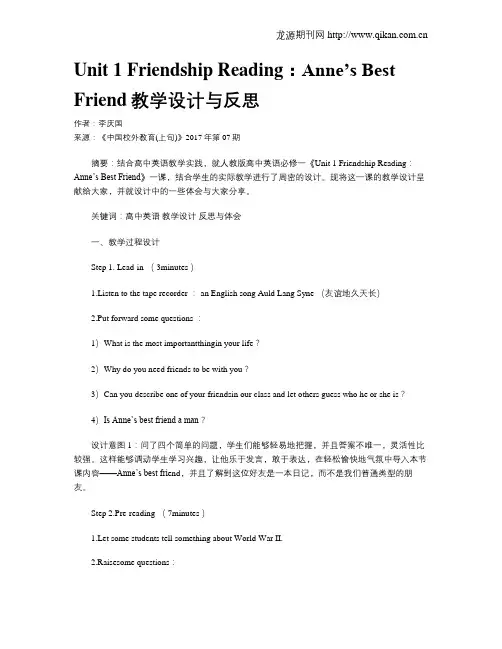
Unit 1 Friendship Reading:Anne’s Best Friend教学设计与反思作者:李庆国来源:《中国校外教育(上旬)》2017年第07期摘要:结合高中英语教学实践,就人教版高中英语必修一《Unit 1 Friendship Reading:Anne’s Best Friend》一课,结合学生的实际教学进行了周密的设计。
现将这一课的教学设计呈献给大家,并就设计中的一些体会与大家分享。
关键词:高中英语教学设计反思与体会一、教学过程设计Step 1. Lead-in ( 3minutes )1.Listen to the tape recorder : an English song Auld Lang Syne (友谊地久天长)2.Put forward some questions :1)What is the most importantthingin your life?2)Why do you need friends to be with you?3)Can you describe one of your friendsin our class and let others guess who he or she is?4)Is Anne’s best friend a man?设计意图1:问了四个简单的问题,学生们能够轻易地把握,并且答案不唯一,灵活性比较强。
这样能够调动学生学习兴趣,让他乐于发言,敢于表达,在轻松愉快地气氛中导入本节课内容——Anne’s best fri end,并且了解到这位好友是一本日记,而不是我们普通类型的朋友。
Step 2.Pre-reading ( 7minutes )1.Let some students tell something about World War II.2.Raisesome questions:1)WasAnne a Nazi?Did she want to be a Nazi?why?2)What hadthe German Nazis done to the Jewish?设计意图2:通过补充关于第二次世界大战历史背景知识,让学生对德国纳粹分子对犹太人的迫害有所了解,从而对本节所学内容更加容易了解和接受。
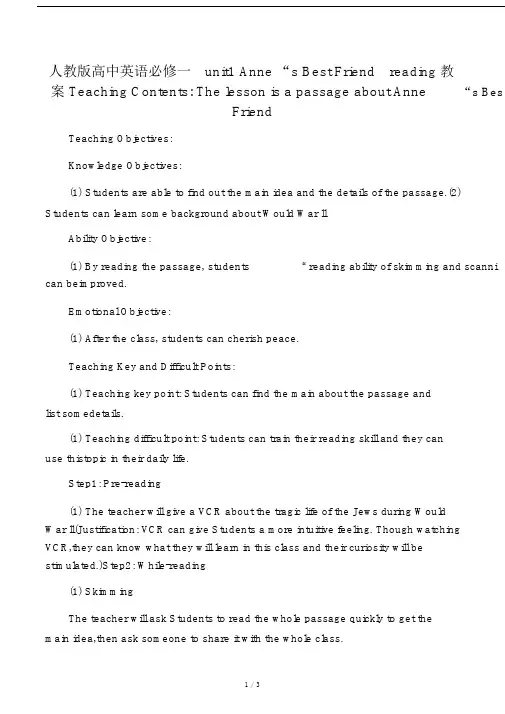
人教版高中英语必修一unit1 Anne “s Best Friend reading 教案 Teaching Contents: The lesson is a passage about Anne“s BesFriendTeaching Objectives:Knowledge Objectives:(1)Students are able to find out the main idea and the details of the passage.(2) Students can learn some background about Would War llAbility Objective:(1) By reading the passage, students“ reading ability of skimming and scanni can beimproved.Emotional Objective:(1)After the class, students can cherish peace.Teaching Key and Difficult Points:(1)Teaching key point: Students can find the main about the passage andlist somedetails.(1)Teaching difficult point: Students can train their reading skill and they canuse thistopic in their daily life.Step1: Pre-reading(1)The teacher will give a VCR about the tragic life of the Jews during WouldWar ll(Justification: VCR can give Students a more intuitive feeling. Though watchingVCR,they can know what they will learn in this class and their curiosity will be stimulated.)Step2: While-reading(1) SkimmingThe teacher will ask Students to read the whole passage quickly to get themain idea,then ask someone to share it with the whole class.(Justification: To help Students understand this passage in short time so that they canimprove their Skimming skill.)(2) ScanningThe teacher will ask Student to read the passage again finish the blank:1.Anne kept a diary because2.She felt very lonely because3.They had to hide because4.Anne named her diary Kitty becauseAfter that, ask them to discuss the following questions :question1: About how long had Anne and her family been in the hiding place whenshe wrote this part of her diary?question2: How did Anne feel about nature before she and her family hid away?question3: Why do you think her feelings changed towards nature?question4: Why did Anne no longer just like looking at nature out of the window?(Justification: Filling in the blank can help Students understand the passage better.The discussion can not cultivate their cooperation sense but also stimulate theirimagination.)Step3 : Post-reading(1) RetellingIn this step, the teacher will invite two of them to narrate the passage in his or her ownwords standing on the platform.(Justification: Standing on the platform can give them much more confidence inexpressing them. Narrating in their own words can train their concluding ability anddeepen their impression of the content of this class. )(2) Group WorkTeacher give Students some questions: Imagine you have to go into hiding like Anneand her family. What would you miss most? Why? Add students can first dicuss themin groups, give their own opinions and choose a member to present theiropinions tothe whole class.(Justification: This step will pratice student“ s ability of speaking anf develop theirspirit of cooperating with others.)Step4 : Summary and HomeworkSummary: The teacher summarizes what they have learnt in this class.Homework: Read the passage fluently and oay attention these importantwords.(Justification: Students can review and consolidate what they have learnt inthis class. )。
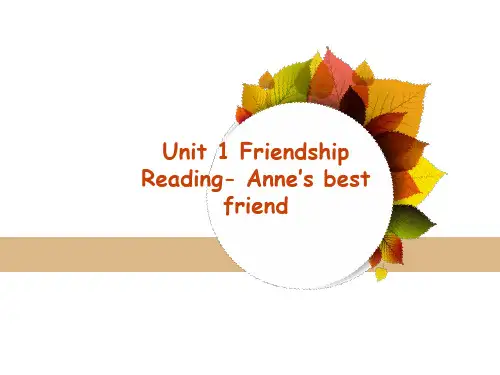
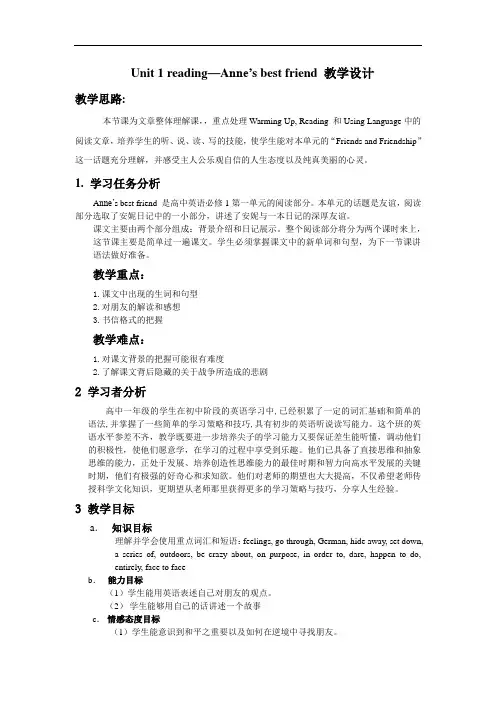
Unit 1 reading—A nne’s best friend 教学设计教学思路:本节课为文章整体理解课,,重点处理Warming Up, Reading 和Using Language中的阅读文章,培养学生的听、说、读、写的技能,使学生能对本单元的“Friends and Friendship”这一话题充分理解,并感受主人公乐观自信的人生态度以及纯真美丽的心灵。
1.学习任务分析A nne’s best friend 是高中英语必修1第一单元的阅读部分。
本单元的话题是友谊,阅读部分选取了安妮日记中的一小部分,讲述了安妮与一本日记的深厚友谊。
课文主要由两个部分组成:背景介绍和日记展示。
整个阅读部分将分为两个课时来上,这节课主要是简单过一遍课文。
学生必须掌握课文中的新单词和句型,为下一节课讲语法做好准备。
教学重点:1.课文中出现的生词和句型2.对朋友的解读和感想3.书信格式的把握教学难点:1.对课文背景的把握可能很有难度2.了解课文背后隐藏的关于战争所造成的悲剧2 学习者分析高中一年级的学生在初中阶段的英语学习中,已经积累了一定的词汇基础和简单的语法,并掌握了一些简单的学习策略和技巧,具有初步的英语听说读写能力。
这个班的英语水平参差不齐,教学既要进一步培养尖子的学习能力又要保证差生能听懂,调动他们的积极性,使他们愿意学,在学习的过程中享受到乐趣。
他们已具备了直接思维和抽象思维的能力,正处于发展、培养创造性思维能力的最佳时期和智力向高水平发展的关键时期,他们有极强的好奇心和求知欲。
他们对老师的期望也大大提高,不仅希望老师传授科学文化知识,更期望从老师那里获得更多的学习策略与技巧,分享人生经验。
3 教学目标a.知识目标理解并学会使用重点词汇和短语:feelings, go through, German, hide away, set down,a series of, outdoors, be crazy about, on purpose, in order to, dare, happen to do,entirely, face to faceb.能力目标(1)学生能用英语表述自己对朋友的观点。
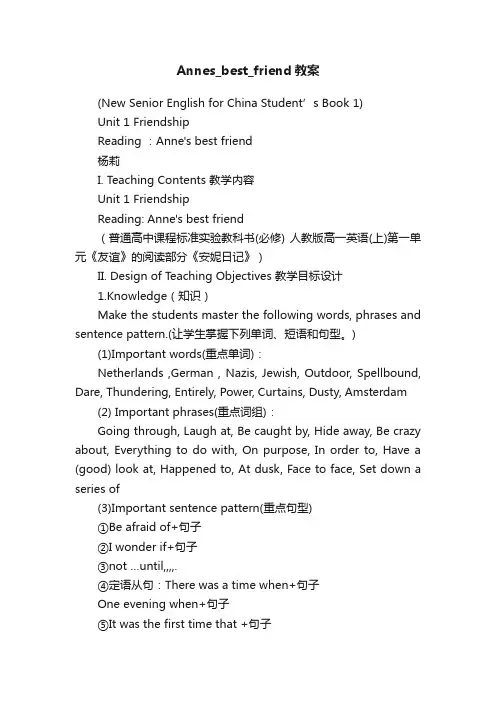
Annes_best_friend教案(New Senior English for China Student’s Book 1)Unit 1 FriendshipReading :Anne's best friend杨莉I. Teaching Contents 教学内容Unit 1 FriendshipReading: Anne's best friend(普通高中课程标准实验教科书(必修) 人教版高一英语(上)第一单元《友谊》的阅读部分《安妮日记》)II. Design of Teaching Objectives 教学目标设计1.Knowledge(知识)Make the students master the following words, phrases and sentence pattern.(让学生掌握下列单词、短语和句型。
)(1)Important words(重点单词):Netherlands ,German , Nazis, Jewish, Outdoor, Spellbound, Dare, Thundering, Entirely, Power, Curtains, Dusty, Amsterdam(2) Important phrases(重点词组):Going through, Laugh at, Be caught by, Hide away, Be crazy about, Everything to do with, On purpose, In order to, Have a (good) look at, Happened to, At dusk, Face to face, Set down a series of(3)Important sentence pattern(重点句型)①Be afraid of+句子②I wonder if+句子③not …until,,,,.④定语从句:There was a time when+句子One evening when+句子⑤It was the first time that +句子2.Skills(技能)①using the skill of skimming to know the main idea of the text and the structure of it (通过使用skimming的方法来了解文章的大致内容和结构)②using the skill of scanning to understand the detail and specific idea of the message and to answer some questions about the text (通过使用scanning的方法来理解文章的细节内容和回来有关文章的一些问题)③asking and answering some questions and discussing it to make a deep understanding of the text (回答和提问以及讨论相关问题来加深对文章的理解)3.Feeling and attitude (情感和态度)①inspiring the sprit of loving nature and life (激发学生热爱自然和生活的情感)②improving th e affection of appreciating those who is be with you and cherishing now(发展学生珍惜身边人,珍惜现在的情感)③develop the feeling of treasuring friendship and the ability to communicate with others(发展学生珍重友谊的情感和培养学生沟通交流的能力)④cultivating the attitude of Anti Racial Discrimina tion(树立反对种族歧视的态度)4.Cultral awareness(文化意识)①knowing something about the German Nazis(了解有关德国纳粹的知识)②knowing something about World WarⅡ(了解有关二战的知识)③knowing something about Jewish(了解有关犹太人的知识)④knowing something about Anne and Anne’s diary(了解有关安妮和安妮日记的知识)5.Learning Strategies (知识策略)①making the students know about Anne and Anne’s diary and the German Nazis, World WarⅡ,etc (让学生了解了安妮,安妮日记,德国纳粹,二战等等的相关知识)②Improving the students’ reading ability through reading activities.(通过系列阅读活动提高学生的阅读理解能力)Ⅲ. Key Points(重点知识)1.learning the words and phrases listed above.(学习上列单词和短语)2.learning the direct speech and indirect speech(学习直接引语和间接引语)3.learning the attributive clause(学习定语从句)4.being able the students to improve their reading comprehension. (提高学生的阅读理解能力)IV. Teaching Difficult Points(教学难点)1.understanding the following sentence correctly. (正确理解下面句子。
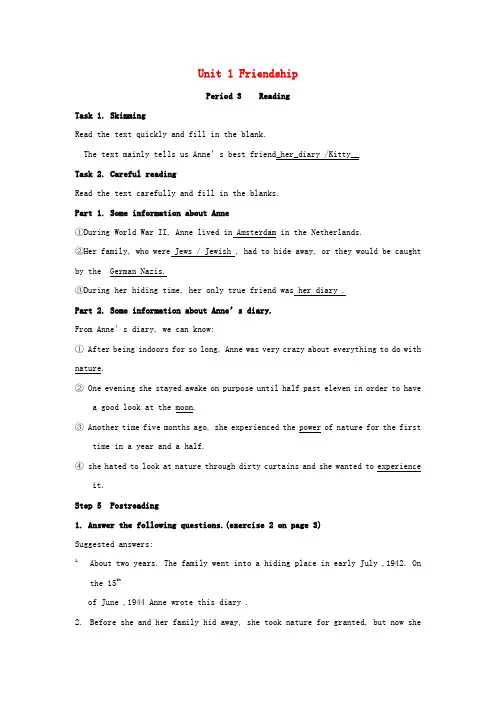
Unit 1 FriendshipPeriod 3 ReadingTask 1. SkimmingRead the text quickly and fill in the blank.The text mainly tells us Anne’s best friend_her_diary /Kitty__Task 2. Careful readingRead the text carefully and fill in the blanks.Part 1. Some information about Anne①During World War II, Anne lived in Amsterdam in the Netherlands.②Her family, who were Jews / Jewish , had to hide away, or they would be caught by the German Nazis.③During her hiding time, her only true friend was her diary .Part 2. Some information about Anne’s diary.From Anne’s diary, we can know:① After being indoors for so long, Anne was very crazy about everything to do with nature.② One evening she stayed awake on purpose until half past eleven in order to havea good look at the moon.③ Another time five months ago, she experienced the power of nature for the firsttime in a year and a half.④ she hated to look at nature through dirty curtains and she wanted to experienceit.Step 5 Postreading1. Answer the following questions.(exercise 2 on page 3)Suggested answers:1.About two years. The family went into a hiding place in early July ,1942. Onthe 15thof June ,1944 Anne wrote this diary .2.Before she and her family hid away, she took nature for granted, but now sheappreciates its beauty and majesty.3.Her feelings have changed because she was no longer able to go out as she pleasedbecause he is in hiding. Losing freedom has made her feel more excited about good and beautiful things around her.4.She did not want to be a ‘prisoner’in the hiding place any longer. She wantedto live a normal life again.2. Retell the storyI lived in ___________in the ______________ during _____________. My family were ______, so we had to ___________ for a year and a half in order ________________ by the German Nazis. During that time I wasn’t able to go ________ for so long that I had ______________ about everything to _______ nature. Once, I decided to look at the moon ___________ by myself.But I didn’t _______ open the window to see the night ___________ because I was afraid of being discovered by the Nazis.I felt very _______ without seeing my old friends. So I had to make a new friend _____________, whom I could tell _________ to. Sadly, at last my family was discovered and caught by _______________ sometime later.。
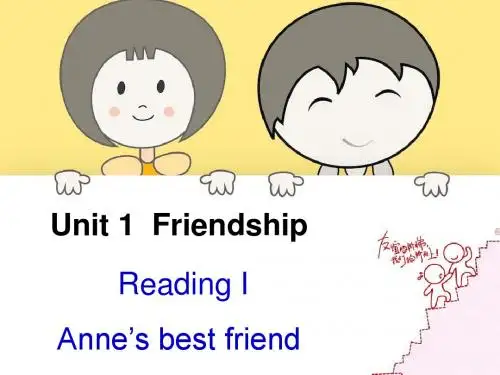
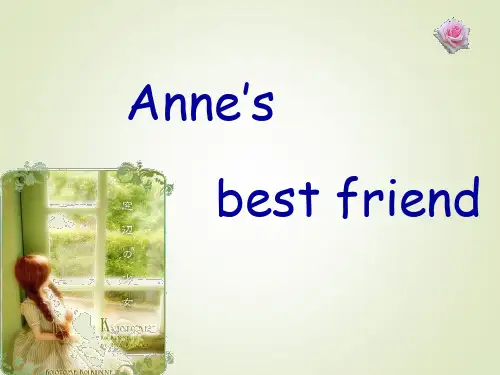

Unit 1 Friendship : Reading——Anne’s Best Friend 教案课时:一课时课型:讲授课一、教材分析本单元的主题是友谊。
这一课时主要是围绕阅读部分来讲,阅读是整个单元的核心部分,是在学习上一课时Warming up and Pre-reading的基础知识上接着对阅读文本“安妮最好的朋友”中词汇知识点和阅读技巧等的学习,为接下来的第三课时的语法知识的学习及以后的听说读写综合技能的练习打好基础。
文章通过一个虚拟的采访——两千年前古希腊作家帕萨尼亚斯与一位当代女孩李燕的对话,向学生介绍了古代和现代奥运会的异同及奥运会的一些基本情况。
文章讲述了犹太女孩安妮为躲避纳粹迫害而藏身于小阁楼中,并把日记作为自己朋友,通过写日记来表达自己孤独和郁闷的心情。
二、教学目标:(一) 知识目标:1. 掌握文章中的生词和短语:reason; list; share; feeling; Netherlands; German; series; outdoors; crazy; nature; purpose; dare; thunder; entirely; power; according; trust; indoors; share. . . with...; go through; hide away; set down; a series of; be crazy about; on purpose; in order to;in one’s power; face to face; according to ;2. 帮助学生找到他们觉得最困难单词和短语,并帮助他们理解。
3. 了解强调句型。
(二) 技能目标:1.更好地掌握Skimming和Scanning。
2.能分析并总结直接引语和间接引语(疑问和陈述)的规律,能熟练地进行两者间的转换,并在生活中运用。
3.能介绍Anne的基本情况,说明她当时的心情和内心的渴望。
人教版高中英语必修一unit1 Anne's Best Friend reading 教案Teaching Contents: The lesson is a passage about Anne's Best FriendTeaching Objectives:Knowledge Objectives:(1) Students are able to find out the main idea and the details of the passage.(2) Students can learn some background about Would War llAbility Objective:(1) By reading the passage, students' reading ability of skimming and scanning can be improved.Emotional Objective:(1) After the class, students can cherish peace.Teaching Key and Difficult Points:(1) Teaching key point: Students can find the main about the passage and list some details.(1) Teaching difficult point: Students can train their reading skill and they can use this topic in their daily life.Step1: Pre-reading(1) The teacher will give a VCR about the tragic life of the Jews during Would War ll (Justification: VCR can give Students a more intuitive feeling. Though watching VCR, they can know what they will learn in this class and their curiosity will be stimulated.) Step2: While-reading(1) SkimmingThe teacher will ask Students to read the whole passage quickly to get the main idea, then ask someone to share it with the whole class.(Justification: To help Students understand this passage in short time so that they can improve their Skimming skill.)(2) ScanningThe teacher will ask Student to read the passage again finish the blank:1. Anne kept a diary because2. She felt very lonely because3. They had to hide because4. Anne named her diary Kitty becauseAfter that, ask them to discuss the following questions :question1: About how long had Anne and her family been in the hiding place when she wrote this part of her diary?question2: How did Anne feel about nature before she and her family hid away? question3: Why do you think her feelings changed towards nature?question4: Why did Anne no longer just like looking at nature out of the window? (Justification: Filling in the blank can help Students understand the passage better. The discussion can not cultivate their cooperation sense but also stimulate their imagination.)Step3 : Post-reading(1) RetellingIn this step, the teacher will invite two of them to narrate the passage in his or her own words standing on the platform.(Justification: Standing on the platform can give them much more confidence in expressing them. Narrating in their own words can train their concluding ability and deepen their impression of the content of this class. )(2) Group WorkTeacher give Students some questions: Imagine you have to go into hiding like Anne and her family. What would you miss most? Why? Add students can first dicuss them in groups, give their own opinions and choose a member to present their opinions to the whole class.(Justification: This step will pratice student's ability of speaking anf develop their spirit of cooperating with others.)Step4 : Summary and HomeworkSummary: The teacher summarizes what they have learnt in this class. Homework: Read the passage fluently and oay attention these important words. (Justification: Students can review and consolidate what they have learnt in this class. )。
普通高中课程标准实验教科书英语必修1Unit 1 Friendship-ReadingANNE'S BEST FRIENDDo you want a friend whom you could tell everything to, like your deepestfeelings and thoughts? Or are you afraid that your friend would laugh at you, orwould not understand what you are going through? Anne Frank wanted the firstkind, so she made her diary her best friend.Anne lived in Amsterdam in the Netherlands during World War II. Her family wasJewish so they had to hide or they would be caught by the German Nazis. She andher family hid away for nearly twenty-five months before they were discovered.During that time the only true friend was her diary. She said, "I don't want to setdown a series of facts in a diary as most people do, but I want this diary itself to bemy friend, and I shall call my friend Kitty." Now read how she felt after being in thehiding place since July 1942.Thursday 15, June, 1944I wonder if it’s because I haven’t’ been able to be outdoors for so long that I’ve g crazy about everything to do with nature. I can well remember that there was a time when a deep blue sky, the song of the birds, moonlight and flowers could never have kept mespellbound. That’s changed since I was here.…For example, when it was so warm, I stayed awake on purpose until half past eleven oneevening in order to have a good look at the moon for once by myself. But as the moon gavefar too much light, I didn’t dare open a window. Another time five months ago, I happened to be upstairs one evening when the window was o pen. I didn’t go downstairs until thewindow had to be shut. The dark, rainy evening, the wind, the thundering clouds held meentirely in their power; it was the first time in a year and a half that I’d seen the night fface.…sadly…I am only able t o look at nature through dirty curtains hanging before very dustywindows. It’s no pleasure looking through these any longer because nature is one thing thatreally must be experienced.普通高中课程标准实验教科书英语必修 1Unit 1 Friendship-Reading TaskFRIENDSHIP IN HAWAIIEvery culture has its own ways to show friendship. On the islands of Hawaii,friendship is part of the "aloha spirit". In the language of the Hawaiians who firstsettled the islands long ago, aloha had a very special meaning. That is "to be withhappiness".Hawaiians believe that once somebody loves the land, they are ready to lovetheir people or community. This is the second most important sign of friendship. Itis called lokahi in the Hawaiian language, which means "oneness with all people".To enjoy the land you should not be selfish. The land is for everyone who lives on it.Today many different peoples call Hawaii their home. Indeed, Hawaii is a placewhere people make one big community from many smaller communities. Eachperson gives kokua (help) to other people so that all feel stronger. It is believed thatthe islands can be a paradise when people live in peace. People are told that theiractions should be as gentle as the wind that blows from the sea. When problemshappen, people are asked to solve them with understanding. So when the people ofHawaii talk about ohana (family), they are really talking about all those who live onthe islands.Living in peace, Hawaiians have developed a third sign of friendship. Thispersonal friendship is shown by giving leis to one another. The lei, a string offlowers, is put over a friend's neck. Then the friend is given a kiss on the cheek.Visitors to the islands are also given leis. When they hear aloha, visitors begin tofeel at home. Aloha also means "goodbye", so visitors will hear it again when theyleave. It can also mean "our hearts singing together". Perhaps this is how mostvisitors will remember their new friendship.普通高中课程标准实验教科书英语必修 1 Unit 1 Friendship-Using Language普通高中课程标准实验教科书英语必修1 Unit 2 English around the world-ReadingTHE ROAD TO MODERN ENGLISHAt the end of the 16th century, about five to seven million people spoke English.Nearly all of them lived in England. Later in the next century, people from Englandmade voyages to conquer other parts of the world and because of that, Englishbegan to be spoken in many other countries. Today, more people speak English astheir first, second or a foreign language than ever before.Native English speakers can understand each other even if they don't speak thesame kind of English. Look at this example:British Betty: Would you like to see my flat?American Amy: Yes. I'd like to come up to your apartment.So why has English changed over time? Actually all languages change anddevelop when cultures meet and communicate with each other. At first the Englishspoken in England between about AD 450 and 1150 was very different from theEnglish spoken today. It was based more on German than the English we speak atpresent. Then gradually between about AD 800 and 1150, English became less likeGerman because those who ruled England spoke first Danish and later French.These new settlers enriched the English language and especially its vocabulary. Soby the 1600's Shakespeare was able to make use of a wider vocabulary than everbefore. In 1620 some British settlers moved to America. Later in the 18th centurysome British people were taken to Australia too. English began to be spoken inboth countries.Finally by the 19th century the language was settled. At that time two bigchanges in English spelling happened: first Samuel Johnson wrote his dictionaryand later Noah Webster wrote The American Dictionary of the English Language.The latter gave a separate identity to American English spelling.English now is also spoken as a foreign or second language in South Asia. Forexample, India has a very large number of fluent English speakers because Britainruled India from 1765 to 1947. During that time English became the language forgovernment and education. English is also spoken in Singapore and Malaysia andcountries in Africa such as South Africa. Today the number of people learningEnglish in China is increasing rapidly. In fact, China may have the largest numberof English learners. Will Chinese English develop its own identity? Only time willtell.普通高中课程标准实验教科书英语必修1 Unit 2 English around the world-Reading TaskTHE OXFORD ENGLISH DICTIONARYYou may think that English dictionaries have been used for many, manycenturies. The spelling of English has always been a problem but it was more of aproblem in the days before a dictionary. Then people could spell words in differentways which you might find interesting. But it made reading English much moredifficult. So dictionaries were invented to encourage everybody to spell the same.In fact, an English dictionary like the kind you use today wasn't made until the timeof the late Qing Dynasty. Three men did most of the important early work ondictionaries: Samuel Johnson, Noah Webster, and James Murray. These men spentnearly all of their lives trying to collect words for their dictionaries. For them, itwasn't only a job; it was a wonderful journey of discovery. The largest dictionary inthe world is the Oxford English Dictionary, or OED for short. The idea for thisdictionary came from an important meeting in Britain in 1857. Twenty-two yearslater, Oxford University asked James Murray to be the editor of its new dictionary.Murray had never been to college. At the age of fourteen, he left his villageschool in Scotland and taught himself while working in a bank. Later he became agreat teacher. After Oxford gave him the job, Murray had a place built in the gardenbehind his house to do his work. Part of it was one metre underground. In winter itfelt like a barn, he had to wear a heavy coat and put his feet in a box to keep warm.Every morning, Murray got out of bed at five o'clock and worked several hoursbefore breakfast. Often he would work by candle light into the evening. Murrayhoped to finish the new dictionary in ten years. But after five years, he was stilladding words for the letter A! Then others went to work with Murray, including histwo daughters. He worked on the dictionary until he was very old. Forty-four yearslater, in 1928, other editors finished it. It included more than 15,000 words in twelvebooks. And you thought your English dictionary was big!普通高中课程标准实验教科书英语必修1 Unit 2 English around the world-Using LanguageSTANDARD ENGLISH AND DIALECTSWhat is standard English? Is it spoken in Britain, the US, Canada, Australia, Indiaand New Zealand? Believe it or not, there is no such thing as standard English.Many people believe the English spoken on TV and the radio is standard English.This is because in the early days of radio, those who reported the news wereexpected to speak excellent English. However, on TV and the radio you will heardifferences in the way people speak.Geography also plays a part in making dialects. Some people who live in themountains of the eastern USA speak with an older kind of English dialect. WhenAmericans moved from one place to another, they took their dialects with them. Sopeople from the mountains in the southeastern USA speak with almost the samedialect as people in the northwestern USA. The USA is a large country in whichmany different dialects are spoken. Although many Americans move a lot, they stillrecognize and understand each other's dialects.When people use words and expressions different from the "standard language",it is called a dialect. American English has many dialects, especially themidwestern, southern, African American and Spanish dialects. Even in some partsof the USA, two people from neighbouring towns speak a little differently. AmericanEnglish has so many dialects because people have come from all over the world.普通高中课程标准实验教科书英语必修1Unit 3 Travel journal-ReadingJOURNEY DOWN THE MEKONGPART1 THE DREAM AND THE PLANMy name is Wang Kun. Ever since middle school, my sister Wang Wei and I havedreamed about taking a great bike trip. Two years ago she bought an expensivemountain bike and then she persuaded me to buy one. Last year, she visited ourcousins, Dao Wei and Yu Hang at their college in Kunming. They are Dai and grewup in western Yunnan Province near the Lancang River, the Chinese part of theriver that is called the Mekong River in other countries. Wang Wei soon got theminterested in cycling too. After graduating from college, we finally got the chance totake a bike trip. I asked my sister, "Where are we going?" It was my sister who firsthad the idea to cycle along the entire Mekong River from where it begins to where itends. Now she is planning our schedule tor the trip.I am fond of my sister but she has one serious shortcoming. She can be reallystubborn. Although she didn't know the best way of getting to places, she insistedthat she organize the trip properly. Now I know that the proper way is always herway. I kept asking her, "When are we leaving and when are we coming back?" Iasked her whether she had looked at a map yet. Of course she hadn't; my sisterdoesn't care about details. So I told her that the source of the Mekong is in QinghaiProvince. She gave me a determined look - the kind that said she would not changeher mind. When I told her that our journey would begin at an altitude of morethan5,000 metres, she seemed to be excited about it. When I told her the air wouldbe hard to breathe and it would be very cold, she said it would be an interestingexperience. I know my sister well. Once she has made up her mind, nothing canchange it. Finally, I had to give in.Several months before our trip, Wang Wei and I went to the library. We found alarge atlas with good maps that showed details of world geography. From the atlaswe could see that the Mekong River begins in a glacier on a Tibetan mountain. Atfirst the river is small and the water is clear and cold. Then it begins to movequickly. It becomes rapids as it passes through deep valleys, travelling acrosswestern Yunnan Province. Sometimes the river becomes a water fall and enterswide valleys. We were both surprised to learn that half of the fiver is in China. Afterit leaves China and high altitude, the Mekong becomes wide, brown and warm. As itenters Southeast Asia, its pace slows. It makes wide bends or meanders throughlow valleys to the plains where rice grows. At last, the fiver delta enters the SouthChina Sea.普通高中课程标准实验教科书英语必修1 Unit 3 Travel Journal-Reading TaskJOURNEY DOWN THE MEKONGPART 6 THE END OF OUR JOURNEYCambodia was in many ways similar to Laos, although it has twice the population.At another inn, we talked with a teacher who told us that half of the people in hercountry couldn't read or write. Her village couldn't even afford to build a school, soshe had to teach outside under a large tent. When we said goodbye, we all felt verylucky to have studied in college. Back on the road, we passed between many hillsand forests. Then we came to the plains and entered Phnom Penh(金边), the capital of Cambodia. In many ways it looked like Vientiane and Ho Chi Minh City; it alsohad wide streets with trees in rows and old French houses. Unlike Vientiane, shipscould travel the Mekong River here. In the centre of the city we visited the palaceand saw a beautiful white elephant. It can only be seen outside the palace onspecial days. We ate an early supper and went to see a great temple with floorsmade of silver.The next morning our group slept late. We were very tired from the long bike ridethe day before. Cycling in the hills had been difficult. Now our cousins had thechance to make jokes about Wang Wei and me. Perhaps, they said, they were thestrong ones! We had lunch at a nice outdoor cafe. then rode out of the city. Twodays later we crossed the border into Vietnam. We began to see many more people,but I wasn't surprised. I read in an atlas before our trip that Vietnam has almostseven times the population of Cambodia. We met a farmer who gave us directionsand told us that he grows a new rice crop four times every year so he can feed morepeople. He also told us that the northern part of his country has many mountainsand it is much cooler than here in the south, where it is flat. Although the flat deltamade it easier for us to cycle, we got warm very quickly. So we drank lots of waterand ate lots of bananas. Soon the delta separated into nine smaller rivers.Two days later, after we had passed thousands of rice fields, we came to the sea.We were tired but also in high spirits: our dream to cycle along the Mekong Riverhad finally come true.普通高中课程标准实验教科书英语必修1 Unit 3 Travel Journal-Using LanguageJOURNEY DOWN THE MEKONGAlthough it was autumn, the snow was already beginning to fall in Tibet. Our legswere so heavy and cold that they felt like blocks of ice. Have you ever seensnowmen ride bicycles? That's what we looked like! Along the way childrendressed in long wool coats stopped to look at us. In the late afternoon we found itwas so cold that our water bottles froze. However, the lakes shone like glass in thesetting sun and looked wonderful. Wang Wei rode in front of me as usual. She isvery reliable and I knew I didn't need to encourage her. To climb the mountains washard work but as we looked around us, we were surprised by the view. We seemedto be able to see for miles. At one point we were so high that we found ourselvescycling through clouds. Then we began going down the hills. It was great funespecially as it gradually became much warmer. In the valleys colorful butterfliesflew around us and we saw many yaks and sheep eating green grass. At this pointwe had to change our caps, coats, gloves and trousers for T-shirts and shorts.In the early evening we always stop to make camp. We put up our tent and thenwe eat. After supper Wang Wei put her head down on her pillow and went to sleepbut I stayed awake. At midnight the sky became clearer and the stars grew brighter.It was so quiet. There was almost no wind - only the flames of our fire for company.As I lay beneath the stars I thought about how far we had already travelled.We will reach Dali in Yunnan Province soon, where our cousins Dao Wei and YuHang will join us. We can hardly wait to see them!普通高中课程标准实验教科书英语必修1Unit 4 Earthquakes-ReadingA NIGHT THE EARTH DIDN’T SLEEPStrange things were happening in the countryside of northeast Hebei. For threedays the water in the village wells rose and fell, rose and fell. Farmers noticed thatthe well walls had deep cracks in them. A smelly gas came out of the cracks. In thefarmyards, the chickens and even the pigs were too nervous to eat. Mice ran out ofthe fields looking for places to hide. Fish jumped out of their bowls and ponds. Atabout 3:00 am on July 28,1976, some people saw bright lights in the sky. The soundof planes could be heard outside the city of Tangshan even when no planes were inthe sky. In the city, the water pipes in some buildings cracked and burst. But theone million people of the city, who thought little of these events, were asleep asusual that night.At 3:42 am everything began to shake. It seemed as if the world was at an end!Eleven kilometres directly below the city the greatest earthquake of the 20thcentury had begun. It was felt in Beijing, which is more than two hundredkilometres away. One-third of the nation felt it. A huge crack that was eightkilometres long and thirty metres wide cut across houses, roads and canals. Steamburst from holes in the ground. Hard hills of rock became rivers of dirt. In fifteenterrible seconds a large city lay in ruins. The suffering of the people was extreme.Two-thirds of them died or were injured during the earthquake. Thousands offamilies were killed and many children were left without parents. The number ofpeople who were killed or injured reached more than 400,000.But how could the survivors believe it was natural? Everywhere they lookednearly every thing was destroyed. All of the city's hospitals,75% of its factories andbuildings and 90% of its homes were gone. Bricks covered the ground like redautumn leaves. No wind, however, could blow them away. Two dams fell and mostof the bridges also fell or were not safe for travelling. The railway tracks were nowuseless pieces of steel. Tens of thousands of cows would never give milk again.Half a million pigs and millions of chickens were dead. Sand now filled the wellsinstead of water. People were shocked. Then, later that afternoon, another bigquake which was almost as strong as the first one shook Tangshan. Some of therescue workers and doctors were trapped under the ruins. More buildings fell down.Water, food, and electricity were hard to get. People began to wonder how long thedisaster would last.All hope was not lost. Soon after the quakes the army sent 150,000 soldiers toTangshan to help the rescue workers. Hundreds of thousands of people werehelped. The army organized teams to dig out those who were trapped and to burythe dead. To the north of the city, most of the10,000 miners were rescued from thecoal mines there. Workers built shelters for survivors whose homes had beendestroyed. Fresh water was taken to the city by train, truck and plane. Slowly, thecity began to breathe again.普通高中课程标准实验教科书英语必修1 Unit 4 Earthquakes-Reading TaskTHE STORY OF AN EYEWITNESSby Jack LondonNever before in history has a city been so completely destroyed. San Franciscois gone. Nothing is left of it but memories and some houses far from the centre ofthe city. Its businesses are gone. The factories, hotels and palaces are all gone too.Within an hour after the earthquake, the smoke of San Francisco's fires could beseen 160 kilometres away. The sun was red in the dark sky. There was no stoppingthe fires. There was no way to organize or communicate. The steel railway trackswere now useless. And the great pipes for carrying water under the streets hadburst. All of the ways man had made to keep the city safe were gone in the thirtyseconds the earth moved.Out at sea it was calm. No wind came up. Yet from every direction - east, west,north, and south, strong winds blew upon the unlucky city. Man himself had tomake ruins of some of the city's best buildings so that they would not be a dangerto those in the streets. A list of buildings undestroyed was now only a fewaddresses. A list of the brave men and women would fill a library. A list of all thosekilled will never be made.Amazing as it may seem, Wednesday night was a quiet night. There were nocrowds. The policemen said nothing; even their horses were quiet. There were noshouts or people doing crazy things. In all those terrible hours I saw not onewoman who cried, not one man who was excited. Before the fires, through the night,thousands and thousands of people who had lost their homes left for safety. Somewere covered in blankets . Sometimes whole families put everything they ownedand could save into wagons . They helped one another climb the high hills aroundthe city. Never in all San Francisco's history were her people so kind as on thatterrible night.普通高中课程标准实验教科书英语必修 1 Unit 4 Earthquakes-Using Language普通高中课程标准实验教科书英语必修1 Unit 5 Nelson Mandela-a modern hero-ReadingELIAS’ STORYMy name is Elias. I am a poor black worker in South Africa. The time when I firstmet Nelson Mandela was a very difficult period of my life. I was twelve years old. Itwas in 1952 and Mandela was the black lawyer to whom I went for advice. Heoffered guidance to poor black people on their legal problems. He was generouswith his time, for which I was grateful.I needed his help because I had very little education. I began school at six. Theschool where I studied for only two years was three kilometers away. I had to leavebecause my family could not continue to pay the school fees and the bus fare. Icould not read or write well. After trying hard, I got a job in a gold mine. However,this was a time when one had got to have a passbook to live in Johannesburg.Sadly I did not have it because I was not born there, and I worried about whether Iwould become out of work.The day when Nelson Mandela helped me was one of my happiest. He told mehow to get the correct papers so I could stay in Johannesburg. I became morehopeful about my future. I never forgot how kind Mandela was, When he organizedthe ANC Youth League, I joined it as soon as I could. He said:"The last thirty years have seen the greatest number of laws stopping our rightsand progress, until today we have reached a stage where we have almost no rightsat all."It was the truth. Black people could not vote or choose their leaders. They couldnot get the jobs they wanted. The parts of town in which they had to live weredecided by white people. The places outside the towns where they were sent to livewere the poorest parts of South Africa. No one could grow food there. In fact asNelson Mandela said:"... we were put into a position in which we had either to accept we were lessimportant, or fight the government. We chose to attack the laws. We first broke thelaw in a way which was peaceful; when this was not allowed.., only then did wedecide to answer violence with violence."As a matter of fact, I do not like violence ... but in 1963 I helped him blow up somegovernment buildings. It was very dangerous because if I was caught I could be putin prison. But I was happy to help because I knew it would help us achieve ourdream of making black and white people equal.普通高中课程标准实验教科书英语必修 1 Unit 5 Nelson Mandela-a modern hero-Reading TaskA FOLLOWER OF BILL CATESI have been a friend of Bill Gates for a long time. I knew him when he was astudent at Harvard University. We were surprised when he left University to set uphis own company "Microsoft" and make his own software. But he was the cleverone! He is very good at writing computer languages and almost all computers nowuse Microsoft software. The program "Word" is used from Britain to China! Ofcourse he has made a lot of money and that makes people very jealous (妒忌的). They want to stop his success. Even the government is against him and has tried tobreak his company into two parts. They say that he is unfair to other people whowant to sell similar software. Because he fits his new software free in every newcomputer, the government says he is stopping other companies from selling theirprograms. This is not fair. Everyone should be able to do what they can to maketheir company bigger. Bill Gates has only done what he can to stop othercompetitors(竞争对手). He is very rich, but he is generous. He has given millions ofdollars to help the education and health of many children around the world. Youcould not meet a better man than Bill Gates.A COMPETITOR OF BILL GATESBill Gates has been very successful and become very rich. He is very generousbut how has he got his money? He has done this by making sure that no one elsewill be able to compete with (竞争) his software. His software is not the best but it isused most widely in the world. When he sees what is needed, he makes a programand produces it quicker than anybody else. That way he gets a large part of thesoftware market. Then he works on improving the software later. He tries hard tostop others making better software. In 1995 the government tried to make thingsfairer for people like me. The government wanted to make Microsoft into twocompanies so that neither of them was so strong nor so rich. This meant that theycould not stop somebody else making new software. I always wonder how he couldget so rich so quickly. Has he done it by fair means? Or has he done it by being acomputer bully (霸) ?普通高中课程标准实验教科书英语必修 1 Unit 5 Nelson Mandela-a modern hero-Using LanguageTHE REST OF ELIAS’ STORYYou cannot imagine how the name of Robben Island made us afraid. It was aprison from which no one escaped. There I spent the hardest time of my life. Butwhen I got there Nelson Mandela was also there and he helped me. Mr Mandelabegan a school for those of us who had little learning. He taught us during thelunch breaks and the evenings when we should have been asleep. We read booksunder our blankets and used anything we could find to make candles to see thewords. I became a good student. I wanted to study for my degree but I was notallowed to do that. Later, Mr Mandela allowed the prison guards to join us. He saidthey should not be stopped from studying for their degrees. They were not clevererthan me, but they did pass their exams. So I knew I could get a degree too. Thatmade me feel good about myself.When I finished the four years in prison, I went to find a job. Since I was bettereducated, I got a job working in an office. However, the police found out and toldmy boss that I had been in prison for blowing up government buildings. So I lost myjob. I did not work again for twenty years until Mr Mandela and the ANC came topower in 1994. All that time my wife and children had to beg for food and help fromrelatives or friends. Luckily Mr Mandela remembered me and gave me a job takingtourists around my old prison on Robben Island. I felt bad the first time I talked to agroup. All the terror and fear of that time came back to me. I remembered thebeatings and the cruelty of the guards and my friends who had died. I felt I wouldnot be able to do it, but my family encouraged me. They said that the job and thepay from the new South African government were my reward after working all my。
Unit 1 Friendship一、教学对象分析本堂课的教学对象是高一新生,他们正处于由初中向高中过渡的适应期,从一个熟悉的环境来到一个全新的校园,因此他们内心渴望被接受和认可,渴望被了解和认识,但同时又有羞涩和腼腆的一面,而本单元关于友谊的话题,贴近他们的实际生活需要,对他们有很强的吸引力和认同感。
但是他们在交友的标准及尺度把握上意识比较模糊,所以需要老师和家长的指导和帮助。
经过初中三年的英语学习,他们已经掌握了一定的语言知识和学习技能,但是因为新接触高中课文,在对如何加强外语语言文化的感知方面会有一定的困难,也需要老师的指导和点拨。
二、教材内容分析本单元是人教版模块一的第一单元,以friend和friendship为话题,使学生通过讨论什么是好朋友,什么是真正的友谊,如何交友等问题,树立正确的交友观。
而本单元的reading部分节选自《安妮日记》,讲述的是在二战时期,犹太人Anne在孤独中只能以日记为友,伴其度过两年的逃亡生活。
语言地道,文字优美,对事物和人物的描写生动,使学生在了解主人公内心世界的同时,深切体会到英语语言文字的优美。
三、教学目标At the end of the lesson, students will be able to(1)pay more attention to the beautiful words and sentences in the reading andread them aloud with their own feelings;(2)develop their critical thinking;(3)strengthen their judgment about good friends and bad friends.四、教学过程Step1 Greetings (1 minute)教师展示几张新校园的图片,并以主人的姿态欢迎新同学的加入。
T: At first, I would like to share several pictures with you. Could you tell me where it is?Ss: Our school.T: Right. All the pictures are about our school, your new school. So welcome to our school. I know you are new in this school. Some of you may feel lonely because you are far away from your old friends. It doesn’t matter. Today I prepare a game for you to make new friends.[设计意图]教师以图片和主人翁的姿态轻松自然的欢迎学生的到来,从而使学生能以更放松的心态融入到课堂中。
Step 2 Warming-up and lead-in (10 minutes)1. Warming-up(1)学生在老师的指导下以“击鼓传花”的游戏方式进行自我介绍。
T: Can you guess the game’s name according to the picture? Yes, “击鼓传花”in Chinese; that is, one is drumming while the others pass round the blossom. When the drum stops, whoever has the flower must do something. The procedures are as follows:① Students who get the flower should stand up;② Make a brief introduction in English;③ After that, stand still and clo se your eyes to say “stop” for the next round.(2) 教师对自己进行一个自我介绍,以此作为模版给学生参照。
T: Ss who get the flower should introduce yourselves like this: Hello, boys and girls. I’m Linda. I like reading, traveling and music. I’m an easy-going girl. I hope everyone would like me.[设计意图]用学生很熟悉的击鼓传花进行自我介绍的游戏方式作为热身不仅可以很快的引起学生注意,而且在游戏的同时不知不觉的已经进入了本节课的话题。
此外这种形式也很好的打消了他们因为彼此互不相识而造成交流上的心理隔阂,为后面的小组活动奠定基础。
2. Lead-in教师通过做游戏交朋友的环节自然过渡到让学生谈论为什么人类需要朋友的问题上来,让多个学生分享自己的观点,激发其他学生从不同角度对该问题的思考,并最终对该问题做出总结。
T: During the play time, I found some of you were nervous and excited. We played the game to make new friends; that is to say, all of us need friends. So, why dowe need friends?T: Just now, different people express their different opinions. From what you said, I made a conclusion about the question:We need friends to tell sad things in our hearts.We need friends to share happiness and secret.We need friends to share our joys and tears.We need friends to support and help us.We need friends to communicate with others.We need friends to learn from each other.We need friends to exchange our points of view.We need friends to talk to and listen to us.We need friends to understand us.[设计意图]以学生自由回答的形式展现问题的答案是促进学生思想碰撞的很好方式,不同学生表述的观点可以激发其余学生多角度的看待该问题。
3. Brainstorming(1) 教师在学生讨论完为什么需要朋友的问题后,继续引导学生集体回答什么可以是我们的朋友,对话题进一步深入的探讨。
T: Generally speaking, when we talk about friends, it often means a person. But do you think it must be a person? Then what can be our friends? Give us some examples.学生回答完问题后,教师在课件上展现图片,让学生更直观的感受到朋友种类的多样性。
(animals, computers, tree holes,…)(2) 通过上面的思想碰撞,学生对于朋友的种类有了更广的认识,下面通过更深入的问题,了解个体学生对选择朋友的初步想法。
T: If you have got a chance to make a non-human friend, what do you choose? Why?[设计意图]这个环节中一共设置了两个问题,从全班共同作答到个体回答从形式和内容上采用逐层深入的形式让学生进行回答,符合认知规律中从浅到深,由易到难的规律。
Step 3 Reading (13 minutes)1. 教师给学生提供历史背景,让学生充分了解主人公当时所处的环境,理解主人公选择日记作为好朋友的原因和心态。
同时课件展示不同版本的“安妮日记”的封面,给学生更直观的视觉冲击。
T: Anne was a German-Jewish teenager. During the World WarⅡ,Hitler wanted to kill all the Jews. So they had to hide, but unluckily Anne was found and killed. Because of the historical background, there were no children around Anne. So she had to make her diary her best friend. Although she has passed away, her best friend still exists.2. 教师设计了几个与课文相关的问题,检验学生通过预习对文章的了解程度。
Q1 How many paragraphs are there in the diary?Three paragraphs.Q2 Who is Anne’s best friend?Her diary, Kitty.Q3 What did Anne talk about with her diary?Her deepest thoughts and feelings about nature.Q4 Why did Anne make her diary her best friend?She thought her diary could keep her secrets.[设计意图]历史背景知识的丰富有助于学生对主人公在日记中所表达的情感的理解,而通过回答问题教师也可以检查学生的预习工作是否到位,这两者都对后面的文学鉴赏有较好的铺垫和促进作用。
3. 教师引导学生找出给自己留下深刻印象的好词好句,并以自己的情感朗诵出来,这是本节课的创新环节。
通过带有情感的朗读,学会欣赏,激发兴趣。
培养学生从赏析的角度提高阅读技能,并让高一学生对文字鉴赏有一个初步的体验。